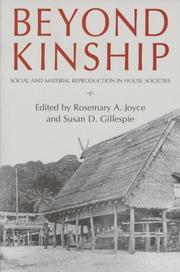| Listing 1 - 10 of 20 | << page >> |
Sort by
|
Book
Abstract | Keywords | Export | Availability | Bookmark
 Loading...
Loading...Choose an application
- Reference Manager
- EndNote
- RefWorks (Direct export to RefWorks)
Ethnology. Cultural anthropology --- Maya [culture or style] --- Maya's --- Antiquity --- Guatemala
Book
ISBN: 0816510954 Year: 1989 Publisher: Tucson : University of Arizona Press,
Abstract | Keywords | Export | Availability | Bookmark
 Loading...
Loading...Choose an application
- Reference Manager
- EndNote
- RefWorks (Direct export to RefWorks)
Aztecs --- Indians of Mexico --- Aztèques --- Indiens d'Amérique --- History --- Kings and rulers --- Histoire --- Rois et souverains --- Chefs
Book
Abstract | Keywords | Export | Availability | Bookmark
 Loading...
Loading...Choose an application
- Reference Manager
- EndNote
- RefWorks (Direct export to RefWorks)
Industrialists --- Biography --- Bosch, Robert, --- Robert Bosch GmbH --- History.
Book
ISBN: 0231182724 0231544340 9780231544344 Year: 2018 Publisher: New York, NY : Columbia University Press,
Abstract | Keywords | Export | Availability | Bookmark
 Loading...
Loading...Choose an application
- Reference Manager
- EndNote
- RefWorks (Direct export to RefWorks)
Facebook claims that it is building a "global community." Whether this sounds utopian, dystopian, or simply self-promotional, there is no denying that social-media platforms have altered social interaction, political life, and outlooks on the world, even for people who do not regularly use them. In this book, Roberto Simanowski takes Facebook as a starting point to investigate our social-media society-and its insidious consequences for our concept of the self.Simanowski contends that while they are often denounced as outlets for narcissism and self-branding, social networks and the practices they cultivate in fact remake the self in their image. Sharing is the outsourcing of one's experiences, encouraging unreflective self-narration rather than conscious self-determination. Instead of experiencing the present, we are stuck ceaselessly documenting and archiving it. We let our lives become episodic autobiographies whose real author is the algorithm lurking behind the interface. As we go about accumulating more material for the platform to arrange for us, our sense of self becomes diminished-and Facebook shapes a subject who no longer minds. Social-media companies' relentless pursuit of personal data for advertising purposes presents users with increasingly targeted, customized information, attenuating cultural memory and fracturing collective identity. Presenting a creative, philosophically informed perspective that speaks candidly to a shared reality, Facebook Society asks us to come to terms with the networked world for our own sake and for all those with whom we share it.
Sosiale medier --- Social networks. --- Networking, Social --- Networks, Social --- Social networking --- Social support systems --- Support systems, Social --- Interpersonal relations --- Cliques (Sociology) --- Microblogs --- Facebook (Firm) --- Facebook(tm) --- Facebook trademark --- Facebook, Inc. --- Facebook (Electronic resource) --- Facebook (Online social network) --- فيس بوك (Electronic resource) --- Fīs būk (Electronic resource) --- Фейсбук (Electronic resource) --- Feĭsbuk (Electronic resource) --- Naaltsoos biniiʼ (Electronic resource) --- 페이스북 (Electronic resource) --- P'eisŭbuk (Electronic resource) --- פייסבוק (Electronic resource) --- フェイスブック (Electronic resource) --- Feisubukku (Electronic resource) --- Feisu bukku (Electronic resource) --- Фэйсбук (Electronic resource) --- Фејсбук (Electronic resource) --- Fejsbuk (Electronic resource) --- Social aspects.

ISBN: 0226986713 Year: 2003 Publisher: Chicago (Ill.) : University of Chicago press,
Abstract | Keywords | Export | Availability | Bookmark
 Loading...
Loading...Choose an application
- Reference Manager
- EndNote
- RefWorks (Direct export to RefWorks)
Multi
ISBN: 9780231544344 9780231182720 0231544340 Year: 2018 Publisher: New York, NY : Columbia University Press,
Abstract | Keywords | Export | Availability | Bookmark
 Loading...
Loading...Choose an application
- Reference Manager
- EndNote
- RefWorks (Direct export to RefWorks)
Facebook claims that it is building a "global community." Whether this sounds utopian, dystopian, or simply self-promotional, there is no denying that social-media platforms have altered social interaction, political life, and outlooks on the world, even for people who do not regularly use them. In this book, Roberto Simanowski takes Facebook as a starting point to investigate our social-media society-and its insidious consequences for our concept of the self.Simanowski contends that while they are often denounced as outlets for narcissism and self-branding, social networks and the practices they cultivate in fact remake the self in their image. Sharing is the outsourcing of one's experiences, encouraging unreflective self-narration rather than conscious self-determination. Instead of experiencing the present, we are stuck ceaselessly documenting and archiving it. We let our lives become episodic autobiographies whose real author is the algorithm lurking behind the interface. As we go about accumulating more material for the platform to arrange for us, our sense of self becomes diminished-and Facebook shapes a subject who no longer minds. Social-media companies' relentless pursuit of personal data for advertising purposes presents users with increasingly targeted, customized information, attenuating cultural memory and fracturing collective identity. Presenting a creative, philosophically informed perspective that speaks candidly to a shared reality, Facebook Society asks us to come to terms with the networked world for our own sake and for all those with whom we share it.
Philosophy --- Social networks. --- Facebook (Firm) --- Facebook (Electronic resource) --- Social aspects.
Book
ISBN: 0300199120 9780300199123 1299975593 9781299975590 9780300188400 0300188404 Year: 2013 Publisher: New Haven : Yale University Press,
Abstract | Keywords | Export | Availability | Bookmark
 Loading...
Loading...Choose an application
- Reference Manager
- EndNote
- RefWorks (Direct export to RefWorks)
Why has humankind developed so differently from other animals? How and why did language, culture, religion, and the arts come into being? In this wide-ranging and ambitious essay, Christoph Türcke offers a new answer to these timeworn questions by scrutinizing the phenomenon of the dream, using it as a psychic fossil connecting us with our Stone Age ancestors. Provocatively, he argues that both civilization and mental processes are the results of a compulsion to repeat early traumas, one to which hallucination, imagination, mind, spirit, and God all developed in response. Until the beginning of the modern era, repetition was synonymous with de-escalation and calming down. Then, automatic machinery gave rise to a new type of repetition, whose effects are permanent alarm and distraction. The new global forces of distraction, Türcke argues, are producing a specific kind of stress that breaks down the barriers between dreams and waking consciousness. Türcke's essay ends with a sobering indictment of this psychic deregulation and the social and economic deregulations that have accompanied it.
Dreams --- Dream interpretation. --- Analysis, Dream --- Dream analysis --- Interpretation, Dream --- Dreaming --- Subconsciousness --- Visions --- Sleep --- Philosophy. --- Psychological aspects. --- Interpretation
Book
ISBN: 9781938645501 1938645502 Year: 2015 Publisher: Santa Fe School for Advanced Research Press
Abstract | Keywords | Export | Availability | Bookmark
 Loading...
Loading...Choose an application
- Reference Manager
- EndNote
- RefWorks (Direct export to RefWorks)
"The contributors to Things in Motion, collectively, demonstrate the dynamic capacity of things in motion, from the point where things emerge from source material, to their circulation in the contemporary world, including their extended circulation through reproduction in other media. The various chapters show that examining the itineraries of things multiplies the assemblages things form and multiplies the sites at which we can recognize things in motion. None of the things discussed seem to ever have died. Their itineraries are continued by their movement in and out of museums and curation facilities, where many of them have come to rest temporarily, the circulation of their images, and their adaptation in sometimes unexpected contemporary material culture. Their itineraries also include the scholarship about them, to which this volume contributes, making it another site assembled by these active things"--Provided by publisher.
Antiquities --- Art objects --- Material culture --- Movement (Philosophy) --- Travel --- Space and time --- Museums --- Museum loans --- Archaeology --- Anthropology --- Philosophy --- Curatorship --- Methodology
Multi
ISBN: 9781512821628 1512821624 Year: 2017 Publisher: Philadelphia : University of Pennsylvania Press,
Abstract | Keywords | Export | Availability | Bookmark
 Loading...
Loading...Choose an application
- Reference Manager
- EndNote
- RefWorks (Direct export to RefWorks)
Beyond Kinship brings together ethnohistorians, archaeologists, and cultural anthropologists for the first time in a common discussion of the social model of house societies proposed by Claude Levi-Strauss. While kinship theory has been central to the study of social organization, an alternative approach has emerged-that of seeing the "house" both as a physical and symbolic structure and a principle of social organization.The house stands as a model social formation that is distinguished by its attention to a number of material domains (land, the dwelling, ritual and nonritual objects). As the essays in this volume make clear, the focus on material culture and on place contributes to the ongoing convergence of anthropology and history and helps erase the artificial distinctions between prehistory and history.Contributions to the volume offer significant new interpretations of primary data as well as reconsidering classic ethnographic material. Beyond Kinship crosses the boundaries within anthropology-not only between cultural anthropology and archaeology but between structural-symbolic and materialist approaches and between American and British schools of anthropology; it is intended to advance the fruitful dialogue now taking place within the field.
Social sciences (general) --- Dwellings. --- Vernacular architecture. --- Kinship. --- Material culture.

ISBN: 0812217233 1512821624 Year: 2017 Publisher: Philadelphia : University of Pennsylvania Press,
Abstract | Keywords | Export | Availability | Bookmark
 Loading...
Loading...Choose an application
- Reference Manager
- EndNote
- RefWorks (Direct export to RefWorks)
Beyond Kinship brings together ethnohistorians, archaeologists, and cultural anthropologists for the first time in a common discussion of the social model of house societies proposed by Claude Levi-Strauss. While kinship theory has been central to the study of social organization, an alternative approach has emerged-that of seeing the "house" both as a physical and symbolic structure and a principle of social organization.The house stands as a model social formation that is distinguished by its attention to a number of material domains (land, the dwelling, ritual and nonritual objects). As the essays in this volume make clear, the focus on material culture and on place contributes to the ongoing convergence of anthropology and history and helps erase the artificial distinctions between prehistory and history.Contributions to the volume offer significant new interpretations of primary data as well as reconsidering classic ethnographic material. Beyond Kinship crosses the boundaries within anthropology-not only between cultural anthropology and archaeology but between structural-symbolic and materialist approaches and between American and British schools of anthropology; it is intended to advance the fruitful dialogue now taking place within the field.
Dwellings. --- Vernacular architecture. --- Kinship. --- Material culture. --- Anthropology. --- Folklore. --- Linguistics.
| Listing 1 - 10 of 20 | << page >> |
Sort by
|

 Search
Search Feedback
Feedback About UniCat
About UniCat  Help
Help News
News